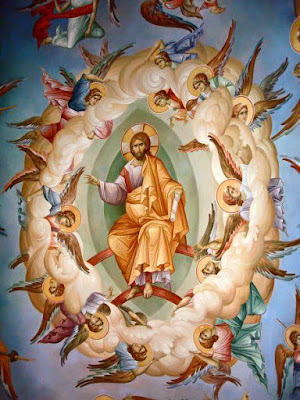Praised be Jesus, Mary, and
Joseph!
Some of us may not immediately
understand how our Lord could be fast asleep in the middle of a very violent
squall at sea. His apostles were panicking because the waves were breaking over
the boat. What was the Lord Jesus doing? He was asleep through it all. Was he
very tired to wake up amidst such great danger? Did he not care enough? “Lord,
do you not care that we are perishing?” his disciples woke him up and so asked
him.
Why were the disciples panicking?
Why do we panic? Perhaps the answer would be the fact that the situation they
found themselves in was very much beyond their control. Is this not the same
reason why we panic? We are simply frightened by situations that are beyond our
control. We always want to be on top of things. We always want to be in
control. If we cannot control a certain situation, at least, we want to prepare
to face it. Kaya nga we use the sciences to predict storms. We want to face it
prepared. Even the big one, the earthquake that is bound to happen, we want to
prepare for its eventual occurrence. We want to be prepared. We want to be in
control of the situation. That is why when things get out of control, we simply
panic.
And this is the reason why the
Lord was asleep through all this. It was not because he was tired. Nor was it
because he did not care. He was asleep because he was in control of the
situation. After all, he is the Lord who spoke to Job out of the storm: “Who
shut within doors the sea…when I set limits for it and fastened the bar of its
door and said: Thus far shall you come and no further, and here shall your
proud waves be stilted.” (Sino ang humarang sa agos ng dagat, nang mula sa
kalaliman ito’y sumambulat?...Ang tubig ay aking nilagyan ng hangganan, upang
ito’y manatili sa likod ng mga harang. Sinabi kong sila’y hanggang doon na
lang, huwag nang lalagpas ang along naglalakihan.) The Lord was in control.
That was why when he awoke from his sleep, the Lord rebuked the wind and said
to the sea, “Quiet! Be still!” and as expected the wind ceased and there was great
calm. The disciples who, at that time did not yet know him, said to each other:
“Who is this whom even the wind and the sea obey?” Who is he? He is the Lord
who has power over all creation!
We are greatly distressed by the
disturbances of the whole created world. In fact, Pope Francis himself has
written an encyclical entitled “Laudato Si” wherein he spoke of the earth as
groaning in travails for it has been abandoned, maltreated, burdened and laid
waste by our irresponsible use of the goods which God has endowed her.
(Francis, Laudato Si, 2.) And indeed, we must do our own part to help arrest
this abuse of the earth which has brought about significant changes in the
climate of the earth. However, while doing our part, we must not forget that
the Lord is in charge and in control of all. We should not forget to call upon
him as the disciples did when they woke the Lord up from his sleep. While we
fortify our homes and participate in earthquake drill, we should not forget to
call upon the Lord and ask him to spare us and keep us from harm. As we prepare
for the monsoon rains and the floods that they will cause, let us not forget to
call upon the Lord and beg him to protect us from such tragedies. For indeed,
the Lord has that sovereign power over the entire created universe. There is a
limit to what we can do. We can do only so far. And so after our part has been
accomplished, we beg the Lord:
“God, who are offended by our
sins but appeased by our penances, may it please you to hear the entreaties of
your people and to turn away the stripes that our transgressions rightly
deserve.
“We beg you, Lord, to repel the
wicked spirits from your family, and to ward off the destructive tempestuous
winds.
“Almighty everlasting God, spare
us in our anxiety and take pity on us in our abasement, so that after the
lightning in the skies and the force of the storm have calmed, even the very
threat of tempest may be an occasion for us to offer you praise.
“Lord Jesus, who uttered a word of command to the raging tempest of
wind and sea and there came a great calm; hear the prayers of your family, and
grant that by this sign of the holy cross all ferocity of the elements may
abate.
“Almighty and merciful God, who heal us by your chastisement and save
us by your forgiveness; grant that we, your suppliants, may be heartened and
consoled by the tranquil weather we desire, and so may ever profit from your
gracious favors; through Christ our Lord.”
Jesus, I trust in you! O Mary
conceived without sin, pray for us who have recourse to thee!
















